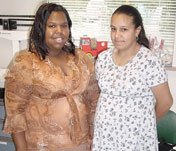Improving Health Outcomes of Medicaid-Insured Women and Their Babies in Michigan
- Lee Anne Roman
- Associate Professor
- Department of Obstetrics, Gynecology and Reproductive Biology
- College of Human Medicine
- Cristian Meghea
- Assistant Professor
- Institute for Health Care Studies
- College of Human Medicine

Lee Anne Roman and Cristian Meghea
Imagine you are young and pregnant and living in difficult life circumstances in one of Michigan's inner cities. You want what's best for you and your baby, but you don't know where to go or how you will pay for care.
Helping the Michigan Department of Community Health (MDCH) and local providers get the right type and level of pre- and post-natal care to Medicaid-insured women in Michigan in a cost effective and efficient way is the goal of Drs. Lee Anne Roman and Cristian Meghea and their research team.

MFMP research assistant Gina Brooks (left) visits a patient.
In addition to MDCH-Medicaid and MDCH-Bureau of Family, Maternal and Child Health, they have worked with a number of partners across projects, including the District 10 and Kent, Detroit, and Genesee health departments, and Spectrum Health. In April of 2010 the MSU collaboration was extended to Ingham County Health Department and Sparrow Hospital. Susan Moran, who directs the MDCH Bureau of Medicaid Program Operations and Quality Assurance, said that "the partnership with MSU researchers is valuable because it enables us to make data-driven program and policy decisions that will help communities best meet the needs of underserved pregnant women and improve health outcomes."
"Women in most urban settings are more likely to have less favorable maternal and infant health outcomes when compared to other geographic areas in Michigan."
Lee Anne Roman
In the Michigan Families Medicaid Project (MFMP) Roman and Meghea tested a comprehensive prenatal maternal risk screener and developed community system of care models. They found that while Medicaid provides a wide array of prenatal and postnatal services, the system can be difficult for women to navigate. In addition, "high-risk" pregnant women are not utilizing available services to the extent they could. All of the Medicaid-insured pregnant women in Michigan (approximately 55,000) have access to enhanced prenatal services (known in Michigan as the Maternal Infant Health Program—MIHP), yet only about 30% of the women in most urban settings participate in MIHP. By comparison, in many areas in northern Michigan and the Upper Peninsula the figure is over 50%.
"If we screen 80% instead of 30% the costs will be higher, but the idea is you're preventing some bad outcomes in the future and an even higher cost."
Cristian Meghea
Roman's team developed a risk screening questionnaire that measures factors such as psychosocial aspects, health behaviors, basic needs (e.g., food and housing), and acute/chronic health conditions. The data go into a state data warehouse where they can be linked to service utilization, birth outcomes, vital records, and other screening information for approved evaluation and research projects. The MDCH has now mandated the use of this screening tool.

Roman (left) and Meghea (right) with MDCH partners Alethia Carr (second) and Susan Moran (third).
Using the risk screening data, Roman and Meghea have identified problems that could be targeted for care improvement. For example, 66% have unplanned pregnancies and 53% screen positive for depressive symptoms.
While population data help identify women at risk and service use, there is also a critical need to address engagement and retention of the highest risk women in care. In the past year, Medicaid-MDCH sponsored Roman's and Meghea's research in Kent County and Grand Rapids aimed at quality improvement (QI) of the system of care. Representatives from health plans, hospitals, and early childhood initiatives got together and, using various QI processes, mapped out a more streamlined system of care.
The next step in the team's research is to apply some of the recommendations that came out of this process in the community. Over the next three to five years they will track outcomes to determine whether these changes actually improve birth outcomes and mothers' health.
As Meghea explains it, "the ideal state would be for all the 50,000-plus women to get screened for risk factors early in pregnancy, and the information shared between providers, so that they get the risk-appropriate level and type of services to improve care." While this goal remains to be reached, Roman and Meghea have, through their research, made a significant contribution towards achieving it.
MFMP is supported by the Department of Obstetrics, Gynecology and Reproductive Biology and is part of a larger MSU commitment to the state of Michigan through the Institute for Health Care Studies.
- Written by Catherine A. Gibson, University Outreach and Engagement